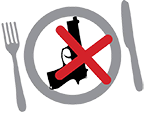Unregistered arms in Palestinian society in Israel
Police estimates from 2013 placed the number of unregistered (“illegal”) small arms in Israel at about 400,000. Many of these are held by Palestinian citizens of Israel. The ready accessibility of firearms and explosive devices in Israel’s Palestinian society is feeding a rise in severe armed violence, including murder, killings and armed attacks, as reflected in the data below. For the most part, these incidents occur inside or near Palestinian communities and their victims are mainly Palestinians. The damage caused by these life-threatening gun crimes is not only incurred by their direct victims. They adversely affect the human security and quality of life of innocent citizens in Palestinian society general.
The video was prepared by the Anti-Weapon Project of Altufulah Center of Nazareth Nurseries Institute and Women against Violence
The main aims of arms use and abuse among Palestinian citizens of Israel are: settling disputes between criminal groups or individuals, settling disputes between families, displaying strength and, lastly, self-defense, given the ineffectiveness of the Israel police in containing criminal activities and armed violence in this society. According to a 2019 series of investigative articles on the subject, armed Palestinian criminal organizations also act as sub-contractors providing criminal services to criminal organizations in Jewish society. In addition, guns are used in some types of social events, such as weddings. According to police statistics, over 70% of illegal shootings in Israel’s Palestinian Arab society are performed by people described as “normative.”
- From the start of 2000 through October 2019, almost 1,400 Palestinian citizens of Israel were murdered, more than 90 of these, in the course of 2019. The police and the Ministry of Public Security do not provide systematic data on the topic. However, the majority of these victims were apparently killed with unlicensed firearms (Haaretz; MK Ahmad Tibi, based on Aman Center)
- According to police data, the percentage of persons in Israel’s Arab society who are involved in physical violence is twice the percentage of Arabs in the general population. The discrepancy is even higher for murder investigations, with a percentage that is 2.5 times higher than the percentage of Arabs in the general population (Israel Police, Israel Comptroller’s Report)
- In the years 2014 to 2016, the percentage of criminal shootings among the Palestinian Arab population in Israel was 17.5 times higher than the percentage of such incidents among the Jewish population. The percentage of persons injured or killed in armed violence in the Palestinian population was 2.5 to 12 times higher than the percentage of those injured or killed in similar incidents in other sections of Israel’s society (ibid)
- In 2014-2016 the suspects of 95% of the criminal shootings in residential areas in Israel were from Israel’s Palestinian citizenry (ibid).
- From the start of 2014 till the end of October 2016, thirty Arab women were murdered in Israel, representing 42% of all the women murdered during this period in Israel (amounting to twice their percentage of the population) (Israel Police, Report by Knesset Research and Information Center).
- Most of the guns held in Palestinian society in Israel reach it from three main sources: theft from the military, smuggling from Jordan and small manufacturers in the West Bank. Additional firearms are obtained via thefts from the police, from private security firms, from Jewish settlements in the West Bank and from private homes and cars.
A proposal for a new Firearms Law, designed to regulate small arms in Israel (tabled in 2017 and not yet discussed in the Knesset) ignores the issue of unregistered arms completely. GFKT holds that Israel’s law must adopt the eradication of unregistered small arms as one of its goals. Towards combatting the current proliferation of such arms, the law should shift its emphasis from enforcement following gun crimes to drastically reducing the existing stockpile and preventing renewed accumulation. This should be achieved by enacting the authority to collect unregistered arms while ensuring impunity for previously holding these arms. Responsibility for the success of such arms collecting lies with the state. As such, it must be promoted in tandem with new, reformative legislation. Gun collection drives must engage the public intensively and be coordinated with community leadership and civil society players.
GFKT Action on this issue
For years now, Gun Free Kitchen Tables has been conducting carefully coordinated action with Palestinian organizations and activists from Israel towards stemming gun crime among Israel’s Palestinian citizenry. This effort includes:
- The comprehensive GFKT report Loose Guns, which touches on the topic and whose launch was covered extensively in Arabic, via Arab media channels.
- A pre-launch meeting in Nazareth and three ensuing workshops discussing the report, all of which engaged with this topic (among others). The formation of a study group in the course of these workshops, whose second year was specifically dedicated to the topic.
- A Testimony Project coordinated with Altufula and Women Against Violence.
- An Expert Gender Opinion emphasizing this issue.
- An action-research women’s group in the community of Mghar, conducted jointly with Mahapach-Taghrir, which completed a pilot data collection project on arms use in the community at the end of 2019.
- One-off workshops and lectures on the subject for Palestinian organizations in Israel (Jezor in Lydd [Lod], Tishreen in Taybeh, etc.)
- Integrating GFKT knowledge and views into the extensive popular Palestinian protest against gun violence in 2019 (a lecture by Meisa Irshaid at the protest tent in Nazareth, etc.)
- Presentations to Knesset Committees on the topic by GFKT activists and study group activists
- The position paper: “Proposals for policy changes towards stemming crime and gun use in Arab society;” a tool to be implemented by an emerging action-group, as of 2020
Issues and Facts
Legal work and campaigns
Articles & Reports

Would you like to get our updates?
Subscribe to our mailing list


